- Getting around Lijiang. Dont stay in the Old Towns more than 2 days, there is nothing to do. KRISS Oct 9, 2013 05:46
- 2013 Beijing Temple Fair BENNYLAU Feb 26, 2013 03:29
- Malaysian traveling from KUL - LAX vis Shanghai PVG ZATI_DY Jan 3, 2013 20:15
Riding into the Sunset: The Wetlands of Xianghai
- Views: 5560
- |Vote: 0 0
- |Add to Favorites
- |Recommend to Friends
I’d set myself a quest this summer. Not only was I going to get to know the North East of China but I was going in search of something very particular: peace. I’m not a city person at the best of times and having been cooped up in smoggy suburbia since March I couldn’t remember the last time I’d seen the sun setting or the stars pricking the night sky and it was beginning to weigh heavily on me. I wanted to get out of the grey noise box of traffic and factories and remind myself that the sky still existed, along with silence.
My itinerary took weeks of preparation not least because no one seemed to be writing in English about the places I wanted to go. The quiet places are, by definition, quiet. So I translated my Chinese travel maps into pinyin and English, and set off with my rucksack on a search for places not just off the beaten track but at the end of all tracks, where only peace could find its way.
I might have been kidding myself that such places exist and it certainly felt that way at first as I sat in the grubby morning light in Changchun’s (长春) long distance bus station. I was the only foreigner and it was naturally assumed I was going to Harbin: what else would I be doing except the usual bright lights, big city circuit of North East China ?
As helpful stewards attempted repeatedly to get me to board the bus for Harbin, I stated for the 10th time that I was going to Tongyu (桶榆). I spotted the Tongyu characters on the front of a bus and headed over to the driver, who helpfully asked me if I was going to Harbin. I repressed a growl, indicated my Tongyu ticket and wedged my rucksack into the luggage hold.
Yeah, no one goes to Tongyu it seems except the locals, or so the driver told me. I smiled and told him I wasn’t going to Tongyu either, I was looking for a place called Xianghai (向海).
Xianghai, nothing but a collection of irregular pale blue shapes on my map surrounded by diagonal pink stripes. I knew it was an area of wetlands and the site of a nature reserve for many rare bird species, but I had no idea if it was possible for me and my rucksack to get there.
Tongyu seemed to creep up out of nowhere. The ubiquitous fields of sunflowers stopped and in a great emptiness the town sprung up. Two or three lane highways bisected the town with single rows of low storey buildings on each side, it felt as temporary as a film set. The streets jingled with bicycle bells and the spluttering of rickshaws and overhead the sky had called forth a flotilla of white clouds to sail against its clean blue. I felt buoyant in this noon buzz and hopped off the bus and onto a 2rmb rickshaw heading for the bus station.
I heard, rather than saw the mini-bus to Xianghai, calling out “Xianghai, Xianghai, Xianghai”. I was delighted and jumped aboard, stowing my bag under a seat and moving up front to where the incredulous driver was gesturing for me to sit. After he’d asked me where I came from, he spent the rest of the journey murmuring “yingguoren” under his breath and grinning whilst I chatted to a young guy called Zheng and made the most of my front row seat.
The road to Xianghai was almost dead straight and stretched along with the sky into the endless distance. The ground was pale, almost white sand and occasional lakes appeared like dropped mirrors to reflect the sky. The grass was a spiky springlike green obviously kept short and it soon became clear that these were pasturelands. Villages appeared like figments of some old-world imagination; with duck or pig filled ponds and herds of cows without a care. The houses were the same pale hue and the intricate courtyards were walled with sand and straw; it was as if the homes had risen from the land itself. Beyond the villages the ground became wetter, a mixture of watermeadow and marsh with a paint-like patterning of wildflowers and the road was lined with gold-leaved rows of Yellow Elms.
My new friend Zheng was a native of Xianghai, born there and had lived there for 25 years and he couldn’t understand why I wanted to go to his hometown. He offered to take me to a cheap hotel owned by his cousin on the only ‘real’ street in town. Having dumped my bag and being eager to explore I accepted his offer of a ride by motorbike to the nature reserve and we cut through a tiny shop and out the other side to get to his house.
Xianghai is a town of just 20,000 people but feels infinitely smaller. Apart from the single main street which looks as if it was built a couple of weeks ago, the rest of the town dissolves into village settlements edged by flat expanses of sand and grass. Zheng lived with his younger brother, wife and baby who burst out crying at the first sight of this ghostly white Westerner much to my embarrassment.
On only the second motorbike ride of my life, we zoomed off along the labyrinthine village lanes avoiding pigs and geese. He took a shortcut along a bank of sand that wound through the puddle marshes, he told me it was used by shepherds to guide their sheep and pointed out in the distance a band of dark cows that were his own herd, shared with his brother.
We arrived at the deserted sanctuary in the sweltering afternoon heat, where he insisted on waiting for me. A young guide wanted to show me around to practise her English, but gave me the whole tour in Chinese, only managing “bye bye” at the end.
I was disappointed. Although the nature reserve swelled with lush green wetlands beyond sight, the only birds to be found ended up being in cages. I was desperately sad to see the endangered red-crowned cranes behind their wire bars and with them the grey-crowned cranes, demoiselle cranes and hooded cranes. An ugly vulture squatted on the ground and a sad white tailed sea eagle sat uncomfortably on the cut-off stump of a tree. A lone, incongruous wolf gazed out from behind another set of bars. On the way back I saw the black curves of swallows sat on telephone wires like rows of crescent moons; free.
Zheng wanted to take me to a reservoir and so we set off again under the vast expanse of sky, the flat sands and meadows spreading outwards beneath the wheels of the bike and the wind in my hair.
A great expanse of water like a fallen chunk of sky greeted us; the flatness of the land making it almost invisible. The sunlight was white as lightning on its surface and I took the chance to ride on the small boat with just 3 other passengers who seemed to have found their way here too. Mallards, grebes and other ducks dotted the water and I watched, mesmerised by the sweeping rise and fall of a single pair of terns catching insects from just above the water.
The afternoon was quickly disappearing by the time we arrived at our final destination of the afternoon, Xianghai Temple, its very pink walls fluorescent against the sky. Beyond the gate a huge courtyard opened up and at the far end a temple hung with flags waited. The temple housed a huge statue of Buddha and the walls were decorated with hundreds of tiny golden figures. Zheng told me there had been a temple on this site for over 200 years, before asking me:
“Do you believe in Buddha ?”
“No.” I replied. “And you ?”
“Me either.”
Behind the temple was another courtyard with a pair of Yellow Elms so old it seemed they had almost lost all colour from their leaves, their great trunks were festooned with red ribbons. A metal pagoda stood in the middle and a couple of monks sat quietly beside it. Further on and over a white stone bridge we came to a tall pedestal, perhaps 8 meters high and another Buddha stood silently on top, watching over us. Flanking her on both sides a deep white stupa. Even without belief it was impossible not to feel the peace here under the gaze of Buddha, the eyes of the early evening.
A quick flick in my dictionary revealed the word for sunset and I asked Zheng if he would take me on one last trip, to a place where the sun would meet the water and with my promise to buy him dinner he agreed. So it was that we took a drive through the fading evening streets in a world of water meadows out to a great house. It might have been haunted, it looked like an old mansion from the West and he drove up to the gates. A dog growled and I was a little nervous but an old man came and opened the long wooden gate. It turned out he was Zheng’s friend and guarding the house for the owner, a property developer in nearby Baicheng (白城). He let us in and told us we could explore.
I felt like a child trespassing in some great stately home, it was under construction and just a shell, echoing spookily. There was nothing but the concrete spiral staircase up to the 2nd floor that was littered with the dried bodies of thousands of dead insects that crunched like fingernails underfoot. Going out onto the balcony we were overlooking a great expanse of water. The sun was beginning to set with such splendour that it brought tears to my eyes, the water was empty except for a lone shadow of a fisherman and the colours of the sunset. We ascended the narrower spiralled steps to the top floor and watched in silence as the sky set on fire and burned in gold and orange, the lake in perfect symmetry. One huge globe disappearing into the lake in such ferocious colour I wondered if it could ever rise again.
We made our way downstairs as the colour leaked away. I asked the old man if we could meet his dog and he turned out to be only a puppy and full of infectious enthusiasm. We were soon walking/running him along the edge of the lake as the sky ripened to a velvet blue and the first stars peeped out. The lone fisherman was sat on the grass working with string to mend his net.
Zheng told me over dinner that he would never leave Xianghai and I don’t think I will either. Though the next day I would get on a bus to my next destination I left a part of myself there, wandering that house perhaps and watching the sunset, night after night, my quest completed.
Information (August 2006)
Xianghai is a protected Nature Reserve and the home of/breeding grounds for many endangered species. It is located in the far North West of Jilin Province close to the border with Inner Mongolia.
Getting there
From: Changchun to Tongyu
By: Bus
Cost: 40.50RMB
Time: 8am – 11.45am
From: Tongyu to Xianghai
By: Minibus
Cost: 10RMB
Time: 12.50pm – 2pm
Attractions
1. English: Xianghai Nature Reserve
Chinese: 向海自然保护区
Pinyin: xiang4 hai2 zi4 ran2 bao3 hu4 qu1
Entrance: 20RMB per person
This is the small part of the reserve where the birds are kept in cages. There are breeding grounds here for the cranes but I don’t know how you get access to them, or if it is possible as they are endangered species.
2. English: Xianghai Reservoir
Chinese: 像海水库
Pinyin: Xiang4 hai2 shui3 ku4
Boat ride: 15RMB per person
Lasts about 1and a half hours
3. English: Xianghai Temple
Chinese: 向海寺
Pinyin: xiang4 hai2 si4
Entrance fee: 10RMB per person
We visited late in the afternoon and it was free.
4. There is also a Natural History Museum but I did not visit this.
Accommodation:
50RMB for a small room with a double bed, no shower or air conditioning.
Tiny local hotel on the top of a restaurant on the main street.
There are much more expensive hotels situated near the reservoir.
Getting back:
From: Xianghai to Taonan (逃南)
By: Bus
Cost: 12RMB
Time: 7.40am – 8.30am
From: Taonan to Baicheng
By: Bus
Cost: 8RMB
Time: 8.45am – 9.30am
It is possible to get a bus back to Tongyu but on that particular morning it didn’t turn up and so I took an alternative route to Baicheng.
Travellers Tips
There are millions of insects here, watch out for the mosquitoes.
It is very possible to visit this area as part of a tour, you can search the web. All the locals I met said I was the first ‘lone’ foreigner they had ever seen and they were delighted to exchange a few words with me.
For the serious birdwatcher, more information (in English) on the wetlands themselves, which are under threat, can be found from the following links:
http://www.birdlife.org/datazone/sites/index.html?action=SitHTMDetails.asp&sid=15377&m=0
http://english.people.com.cn/200507/28/eng20050728_198829.html
http://www.scwp.info/china/xianghai.shtml
Finally, the biggest thanks to my friend & guide Zheng.



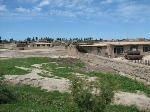
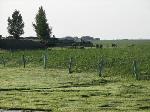
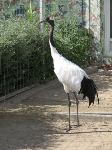
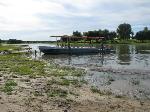
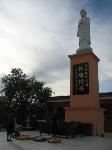
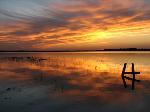
 Copyright © 1998-2026 All rights reserved.
Copyright © 1998-2026 All rights reserved.